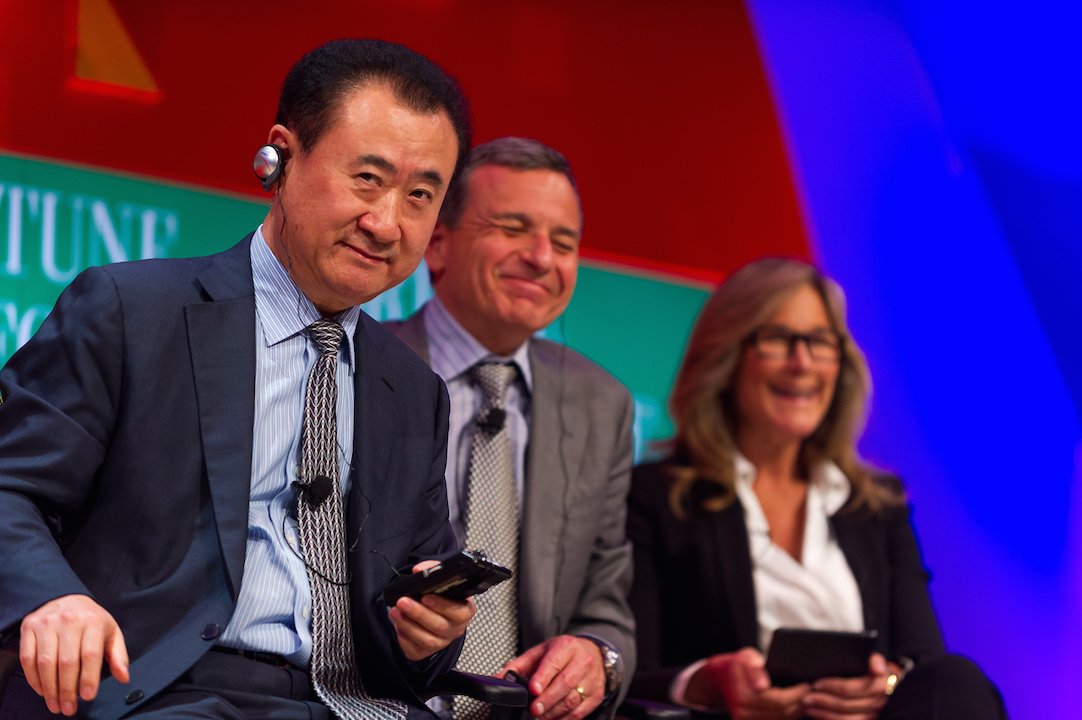
Dalian Wanda Group CEO Wang Jianlin (foreground) at the Fortune Global Forum 2013 with Disney CEO Bob Iger and then CEO of Burberry, Anglea Ahdrendts. (Creative Commons—Stephen Chow).
Following is the first in a regular CFI series of summaries of notable happenings in law and regulation affecting the entertainment business in China, the United States and the rest of the world.
Wanda-Legendary Deal
The U.S. Department of Commerce approved Dalian Wanda Group’s $3.5 billion purchase of Legendary Entertainment, just weeks after the announcement of the deal, which Wanda took to indicate “the positive attitude that the U.S. government has towards Sino-U.S. cultural exchange,” the Chinese real estate-turned-entertainment conglomerate said in a statement.
The next stop on this deal train is China, where the purchase must be okayed by both the National Development and Reform Commission and the Ministry of Commerce. Neither body is expected to raise any issues given Wanda’s position at the forefront of the Chinese government’s initiatives to create a cultural industry with global reach.
Wanda already owns AMC Entertainment, the second-largest movie theater operator in the U.S., and, while its acquisition of Legendary would violate U.S. antitrust laws if it were an American company, its status as a foreign entity will allow it to control both a studio and cinemas in the U.S. The antitrust law in question, known as the Paramount Decree, stems from a 1948 U.S. Supreme Court ruling against Paramount Pictures that compelled the separation of motion picture production and exhibition companies.
Industry insiders see this deal as just the beginning of a boom in Chinese acquisitions of Hollywood studios, which will encourage the development of more U.S.-China co-productions with a big-budget Hollywood feel that will avoid being subject to China’s movie import quotas. Other companies may feel compelled to jump into the race to buy into Hollywood, “lest they fall behind,” said one such insider, noting that e-commerce giant Alibaba founder Jack Ma’s name frequently comes up as the next potential major buyer.
Cultural ‘Blacklist’
China’s Ministry of Culture announced this week that it will establish a comprehensive list of “harmful cultural products” which will include movies and TV programs. The blacklist will also extend to businesses and individuals involved in the production of these products, and is part of a broader crackdown on unwholesome content being pushed from the very top of China’s leadership. The Ministry of Culture has already published blacklists of online cartoons and music. Celebrities and others in the entertainment industry who engage in illegal or immoral behavior can also be blacklisted, and, most recently, several highly popular online series were removed for apparently “being too vulgar, bloody and superstitious.”
Corruption Case
Lu Fanxi, former vice president of online video giant Youku Tudou, was reported detained by Chinese authorities for suspected corruption. It was not clear when Lu was detained, as he left Youku Tudou in July, before Alibaba Group completed its $4.8 billion acquisition of the company. President Xi Jinping’s ongoing large-scale anti-corruption campaign has caught several other senior media executives in its net, including Alibaba Pictures’ Patrick Liu Chunning and Fosun Chairman Guo Guangchang, who briefly went missing late last year.
On Screen Smoking
In international news, this week the World Health Organization recommended that movies with characters who smoke cigarettes should be rated and carry warnings, while the manager of the WHO’S initiative noted that China has already ordered filmmakers to cut down on depictions of “excessive smoking.” While it’s true that China has had a rule on the books since 2011, the relatively subjective standard means that enforcement has been spotty, with the recent hit Mr. Six reportedly featured 102 smoking scenes during the film’s 137 minutes, prompting calls for further regulations and warning labels on the film from within China. A draft regulation issued in November 2014 would ban all on-screen smoking entirely and impose fines for violations, but its current status is unclear.
Legal Discussions
Metropolitan Corporate Counsel has published an insightful and informative Q&A with entertainment finance lawyer Christopher Staton Spicer on the challenges of doing China deals. The biggest challenge, according to Staton Spicer? Finding Chinese partners who understand the business and legal aspects of working in China, which is especially important as more and more deals are turning away from Hollywood to focus on the production of films that can play well in China.
Our partners at China Law Blog have been running a useful series on litigation and arbitration in China. Though geared towards the manufacturing sector, there are plenty of useful takeaways for anyone doing business in China, so far covering insurance considerations and understanding the liabilities faced by China consultants.





